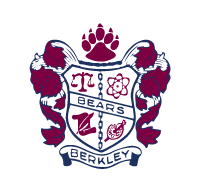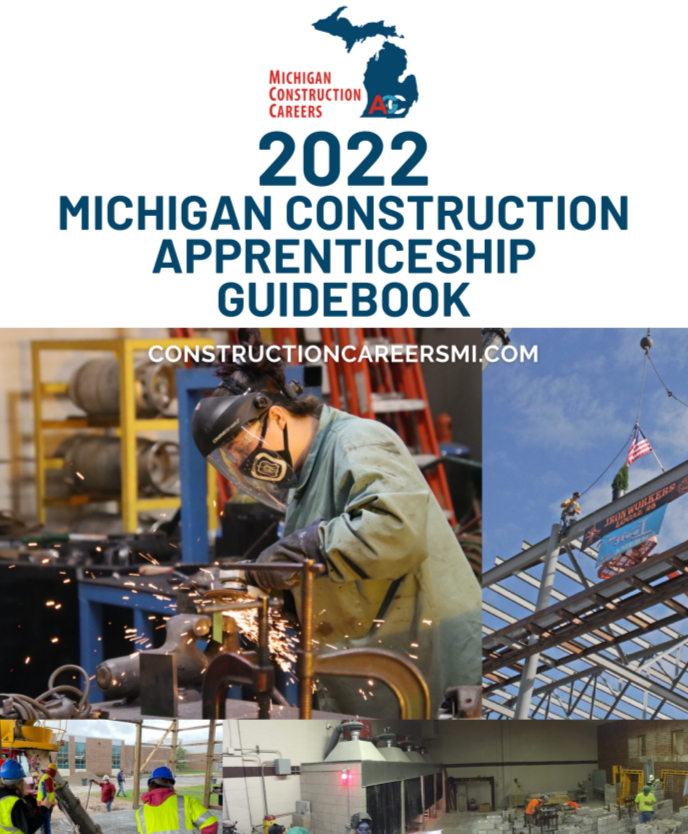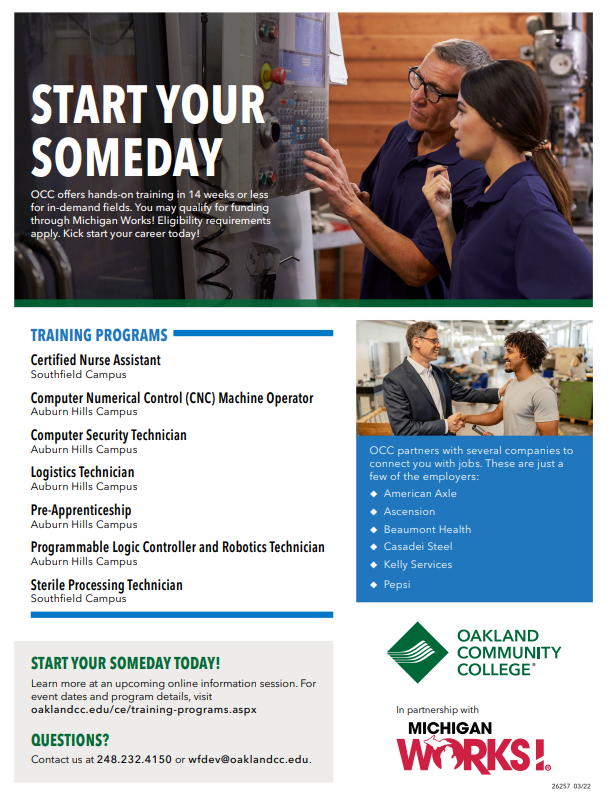
All things Careers, Apprenticeships, Military, Jobs, + Leadership
Through the BHS College + Career Center, students are able to access information about post secondary opportunities, including college, trade schools, military service, apprenticeships, employment, and training programs.
Please contact BHS College + Career Counselor, Christina Belsky, with any questions! Or Schedule a meeting with Mrs. Belsky.
Xello - Online Career Exploration Tool for BHS students + families!
The BHS Counseling Department is always looking for new ways to support students in their academic lives, their career explorations and their potential future pathways. We as a department get asked all of the time about how students can connect their strengths to a future career or how they can connect their interests to majors and job opportunities. Students and families want to learn more about different college campuses, career tracks and don’t often know where to begin.
You are in luck! We have a program that can help with all of the above and more! AND … you don’t have to be at school to access it! You can do it from home! The program is Xello.
What is Xello?
Xello is an engaging online program that helps students build the skills, knowledge and exposure to be future ready. The program uses an investigative, discovery-based learning process so that students better understand themselves, their future career options, and the 21st century skills they’ll need to succeed. (View short video or click here.)
BHS Students: Complete "Start Here!" lesson
This lesson must be completed every year of high school.
The “Start Here!” lesson must be completed every school year, as it fulfills the state-required Education Development Plan (EDP) by helping students think about their future after BHS.
See below directions on how to complete the "Start Here!" lesson!
Students should use Xello to:
Build Self-knowledge:
- Define their interests, skills, preferences, and aspirations so they can explore the opportunities right for them.
- What do I like, what am I good at, what is important to me?
Explore Options:
- Learn about career possibilities and educational pathways by exploring rich, engaging content and lessons.
- Research + favorite colleges, majors, careers, training options and more!
Create a Plan:
- Create dynamic actionable plans that outline the steps needed to achieve school, career, and life goals.
- What do I need to do to attain these goals/dreams?
Learn & Reassess:
- Develop age appropriate skills and knowledge for success in school and beyond.
- Personal Finance, Job Interviewing, Career Back-up Plans, Study Skills & Habits, etc!
Here are some ways students should use Xello at home:
Access Xello via the BHS College + Career Center course in Schoology!
Complete an interactive Lesson:
-
These are activities assigned to your student’s grade level. Lessons help students build vital skills for persistence, resilience, and real-world success.
Build their About Me page:
-
The About Me page helps your student to discover more about themselves. They define their interests, skills, and aspirations. Using this self-knowledge, they can explore the opportunities that are right for them.
Explore Options:
-
They learn about career possibilities and educational pathways. While reading through different career and school profiles, they save their favorites.
Xello Family for BHS parents + guardians!
On January 20th, parents + guardians will receive an email from noreply@xello.world with the subject line, “Welcome to Xello!” providing an activation link to your Xello Family account.
- NOTE: This email may go to your Spam folder and the activation link will expire after 7 days.
- If you did not receive the email or the link expired, please contact Christina Belsky.
Click here for an overview of key features and how to get around your Xello Family account!
Xello Log-in:
 Student Log-in
Student Log-in
Go to “BHS Links” bookmark folder/bar in upper left corner.
Click on "Clever" > "sign in with Google" > scroll to "Xello" > click on "Xello"
Michigan Achievement Skills Scholarship
Michigan Achievement Skills Scholarship
With the Michigan Achievement Skills Scholarship, students can receive up to $4,000 over two years to attend an eligible career training program in Michigan.
Students who graduate from high school in Michigan with a diploma or certificate of completion or achieved a high school equivalency certificate in 2023 or after may be eligible. Check out our list of eligible career training programs and then fill out the application to get started on your journey.
Eligibility Requirements
- Be a Michigan resident for at least the immediately preceding year.
- Graduated from high school in Michigan with a diploma or a certificate of completion or achieved a high school equivalency certificate in 2023 or after.
- Have not yet earned an associate or bachelor’s degree.
- Have not yet earned a degree, certificate, or other credential with this scholarship.
Michigan Achievement Scholarship Skills Application:
- Find an eligible career training provider that's right for you!
- Complete the Michigan Achievement Skills Scholarship application in the MiSSG Student Portal.
- Enroll in an eligible career training program.
Note: Be sure to give the provider of the career training program proof of your high school diploma, certificate or completion or equivalent.
Part-time Job Postings for Students
Part-time Jobs for Students
Part-time job postings for students! BHS does not vet or guarantee positions below for BHS students. See the Counseling News for latest postings!
Need a Work Permit?
Obtaining a Work Permit
Print out a blank permit
Click on the link that reflects your age at time of employment:
Complete the required sections
- You must complete Section 1.
- Your employer must complete Section 2.
- Once both sections are completed, please come down to the Office or email an copy to BHS Main Office Secretary, Kara Watson, or Counseling Center Secretary, Lesli Wyatt
Enrichment + Leadership Opportunities | Summer + Pre-College Programs
Where to look...
Local colleges and universities usually offer summer programs to high school students. If you google a local college and "summer camp for high school students", you will yield a lot results in your search! Check out the BHS PreCollege + Summer Program List for some great resources in locating pre-college, enrichment, and summer camp opportunities!
Trades | Apprenticeships
Apprenticeship Information + Listings
Oakland Community College Apprenticeship Programs
- Pre-apprenticeship programs where students can explore a trade or technical occupation and develop the skills and knowledge needed to prepare themselves for employment or apprenticeship opportunities.
- Apprenticeship programs where students receive the related technical instruction to complete a U.S. Department of Labor registered apprenticeship program while earning wages from day one. Students are also advised on certificate and associate degree options after successful completion of an apprenticeship.
Jump Start Your Career Through Apprenticeships! (Apprenticeship.gov)
What is Apprenticeship? Apprenticeship is an industry-driven, high-quality career pathway where employers can develop and prepare their future workforce, and individuals can obtain paid work experience, classroom instruction, and a portable, nationally-recognized credential.
Why Become an Apprentice? Through an apprenticeship program, you can obtain paid, relevant workplace experience while acquiring the skills and credentials that employer’s value. 94% of apprentices who complete an apprenticeship retain employment, with an average annual salary of $70,000. Learn more about the benefits of apprenticeship for career seekers and prospective apprentices.
MI Apprenticeship
Oakland County Apprenticeship Book
This valuable resource provides important information about career opportunities in Oakland County and the region that could change your life!
Michigan Works Oakland County Apprenticeship Services
How do I become an Apprentice?
There are two ways to become an apprentice:
- through a partnership between a labor organization and an employer (called a Joint Apprenticeship Committee, or a JAC)
- through a partnership between a community college and an employer.
JACs may have different requirements or procedures for applying for an apprenticeship; some will accept applications only from current employees and others are open to anyone. Applicants must pass a test and those with the highest scores are hired first. You should contact the JAC for a particular apprenticeship for more information.
The second path to an apprenticeship is a partnership between a community college and an employer. The classes are usually offered on the college’s regular schedule, but remember that just taking the classes doesn’t make you an apprentice; you must be hired by an apprenticeship employer first. If you’re interested in a particular apprenticeship but aren’t sure whether there are any openings, contact the Apprentice Coordinator at the college for assistance.
*All certified apprentices who attend a community college can apply their related technical instruction toward an associate’s degree. An apprentice can receive up to 32 credit hours toward his/her associate’s degree, which consists of 62 credit hours. Contact Oakland Community College at 248-232-4050 or another community college of your choice.
MAT2 Michigan Advanced Technician Training Program
MAT2 Apprenticeship Program Benefits:
- Earn while you learn & gain a debt-free AAS degree at Henry Ford College or Macomb Community College
- 3 years of coordinated school and work
- Apply skills learned at school to real-world situations
- 2-year job guarantee upon successful completion
Seniors should apply here!
Apprenti - Southeast Michigan (Tech Apprenticeships)
Tech is the fastest-growing industry in the world, and 1 in 20 job openings are in tech. Our unique apprenticeship program puts you on a straightforward, step-by-step fast track toward your dream job. The tech industry is seeking to diversify its workforce, so Apprenti is actively recruiting women, people of color, and veterans — although anyone is eligible to apply.
Construction + Trades Apprenticeships
MUST Construction Apprenticeships | Explore trades by video
Southeast Michigan Construction Academy
Access for All (Free Construction Training Program!)
Access for All is a free 300 hour construction trades training program that prepares you for a rewarding career in the construction industry. We provide support for basic needs such as transportation and child care, and a small stipend for expenses during the training.
Graduates earn credentials in: OSHA 30, First Aid/CPR, and Asbestos, Lead and Silica Awareness and a nationally recognized certificate from the North America’s Building Trades Union (NABTU).
For more than 30 years, we’ve helped thousands of workers complete their education and find full-time employment.
SERVICES INCLUDE:
- Career planning and coaching
- Job Placement assistance
- Occupational Skills Training
- Skills assessments
- Supportive Services
- Employability Skills Workshops
- Pre-apprenticeship and Apprenticeship Training
REQUIREMENTS:
Program Requirements
- Score at least a Level 4 in WorkKeys Applied Math, Reading for Information, and Locating Information assessments. If your scores are lower, let us know. We can connect you with ACT Career Ready 101 or the Khan Academy. Many of our students also found help through local adult education programs.
- Be at least 18 years old with a valid driver’s license.
- Possess a high school diploma or GED.
- Pass a drug test, criminal background check, and physical exam.
- Have reliable transportation to get to and from worksites.
- Complete a personal interview with a panel.
- Each site may have additional requirements.
IBEW Lineman + Tree Trimming Apprenticeships
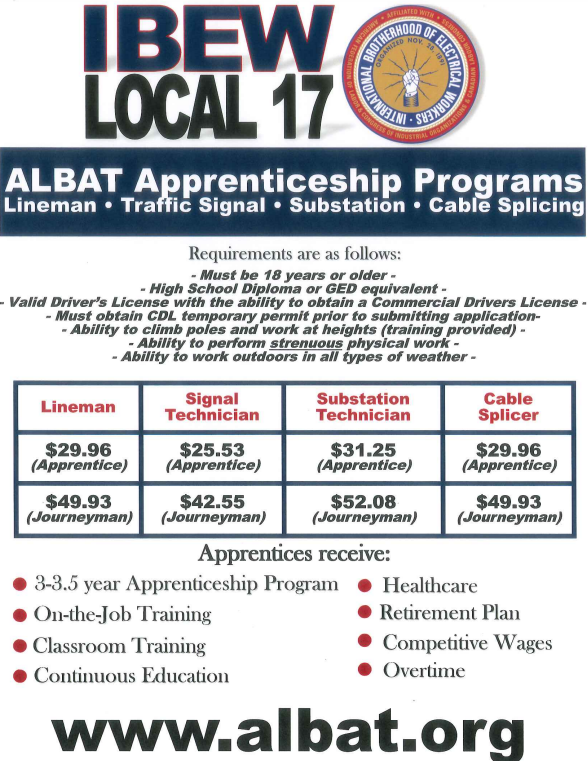
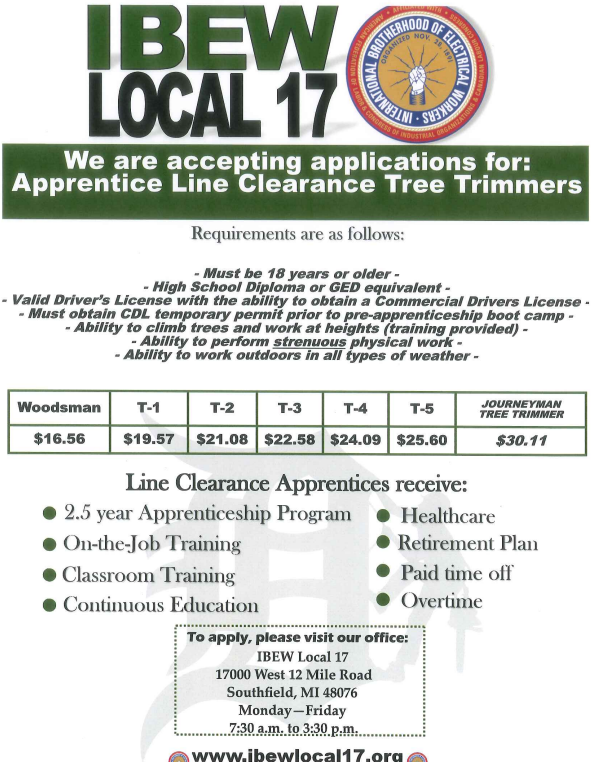
DTE Line Worker + Substation Operator Apprencticeships

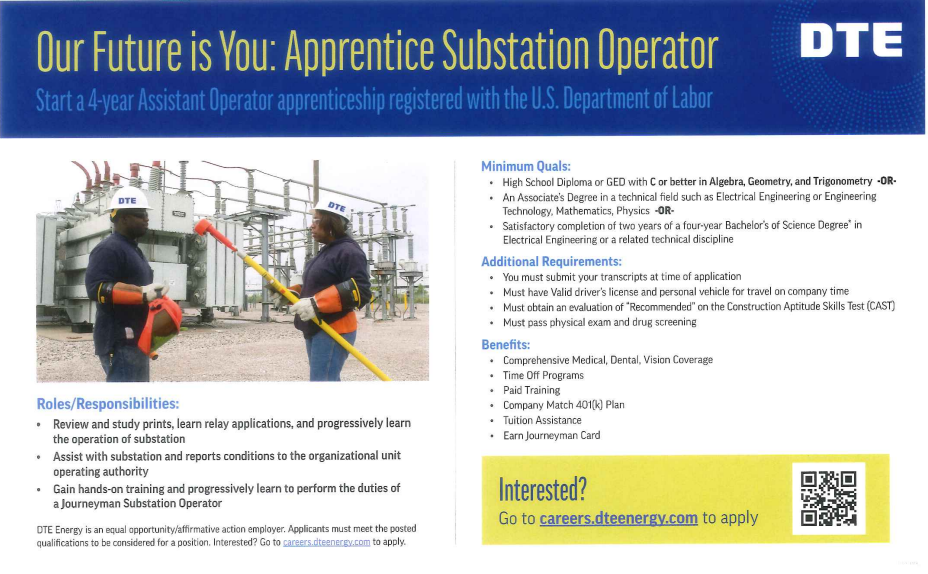
Apprenticeship News & Info!
WorkKeys Career Readiness Certificate (assessment available at OCC)
Some apprenticeship programs require a WorkKeys Career Readiness Certificate* to be submitted with your application. To learn more or to take the assessment visit: Oakland Comunity College (OCC) M-TEC Testing Center
Contact Info: 248-232-4168 or MTECTestCenter@oaklandcc.edu
Michigan Registered Apprenticeship Data Dashboard
This online tool allows users to explore registered apprenticeships in regions across the state, including how many active apprentices there are and the occupations and industries in which they are employed.
Press Release: $6 million in Registered Apprenticeship grants will support career opportunities for underrepresented populations - March 1, 2021
Certificate Programs | Career Training
Certificate & Career Training Programs
Looking for a career, 2-4 years of college isn't for you?
Check out the Certificate and Job Training Programs at Oakland Community College!
- Training programs that prepare students for jobs in fields such as supply chain logistics, advanced manufacturing, CNC, sterile processing, CNA, and computer security.
- Pre-apprenticeship programs where students can explore a trade or technical occupation and develop the skills and knowledge needed to prepare themselves for employment or apprenticeship opportunities.
- Apprenticeship programs where students receive the related technical instruction to complete a U.S. Department of Labor registered apprenticeship program while earning wages from day one. Students are also advised on certificate and associate degree options after successful completion of an apprenticeship.
- 10 more programs just added!!!
- General Accounting Certificate
- Automobile Servicing Certificate
- CAD - Level I Fundamentals Certificate of Achievement
- CAD - Level II Intermediate Certificate
- CIS - CISCO Internetworking Certificate of Achievement
- CIS - Cybersecurity Certificate
- CIS - Information Technology Support Certificate
- CIS - Software Engineering Certificate
- CIS - Web Designer Certificate
- Collision Auto Repair - Non-Structural Repair Technology Certificate
- Collision Auto Repair - Paint and Refinish Technology Certificate
- Collision Auto Repair - Body Repair Technician Assistant Certificate of Achievement
- Collision Auto Repair - Detailer/Painter Assistant Certificate of Achievement
- Construction Management Certificate
- Criminal Justice - Homeland Security Certificate of Achievement
- Criminal Justice - Police Academy Certificate of Achievement
- Digital Media Communications Certificate
- Baking and Pastry Arts Certificate
- Emergency Medical Services - EMT Certificate of Achievement
- Emergency Medical Services - Paramedic Certificate
- Fire Academy Certificate of Achievement
- Health Care Administration Certificate
- HVAC/R - Building Air and Water Balance/Retro-Commissioning Certificate
- HVAC/R - Air Conditioning Certificate
- HVAC/R - Heating Certificate
- HVAC/R - Refrigeration Certificate
- HVAC/R - Alternative Thermal Energy Systems Certificate of Achievement
- Library Technical Services Certificate
- Medical Assisting Certificate
- Medical Assisting - Medical Insurance Coding and Billing Certificate of Achievement
- Medical Assisting - Medical Office Administrative Procedures Certificate of Achievement
- Medical Assisting - Phlebotomy Certificate of Achievement
- Machine Tool Technology Certificate
- Music Certificate
- Photographic Technology Certificate
- Paralegal - Post-Bachelor Degree Professional Paralegal Certificate
- Robotics/Automated Systems Technology Certificate
- Robotics/Automated Systems Technology Programmable Controllers Certificate of Achievement
- Welding/Fabrication Technology - Level 1 Fundamentals
- Welding/Fabrication Technology - Level 2 Intermediate
EMERGENCY SERVICES training programs at OCC
INDUSTRIAL TECHNOLOGY training programs at OCC
HEALTH CARE SERVICES Training Programs at OCC
Michigan Dental Assisting School
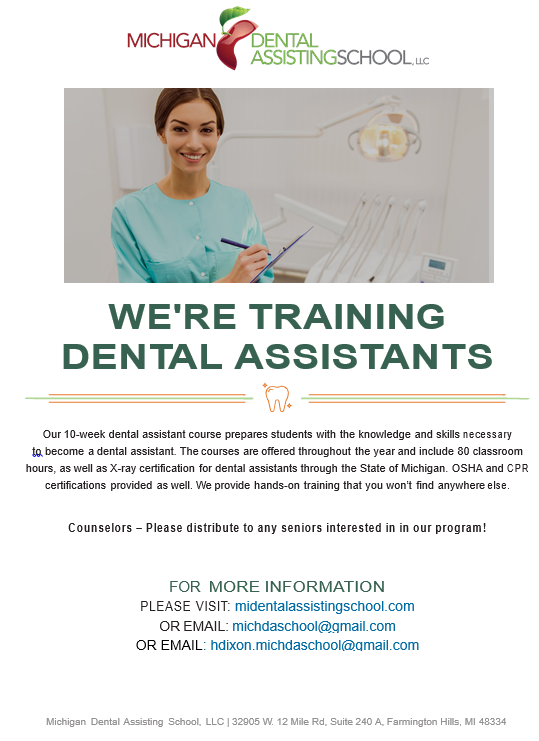
Joining the Military | Service Academies Information | Youth Programs
Types of Military Service
Information below from USA.gov and Today's Military
The U.S. Military consists of six active-duty Service branches and their respective Guard and Reserve components. Together, they offer a broad variety of ways to serve.

The Army is part of the Department of Defense (DOD) and is the largest of the five military branches. It handles major ground combat missions, especially operations that are ongoing. The Army Special Forces unit is known as the Green Berets for its headgear. Service members are known as soldiers. The reserve components are Army Reserve and Army National Guard.
- ARMY
- ARMY RESERVE
- Michigan ARMY NATIONAL GUARD
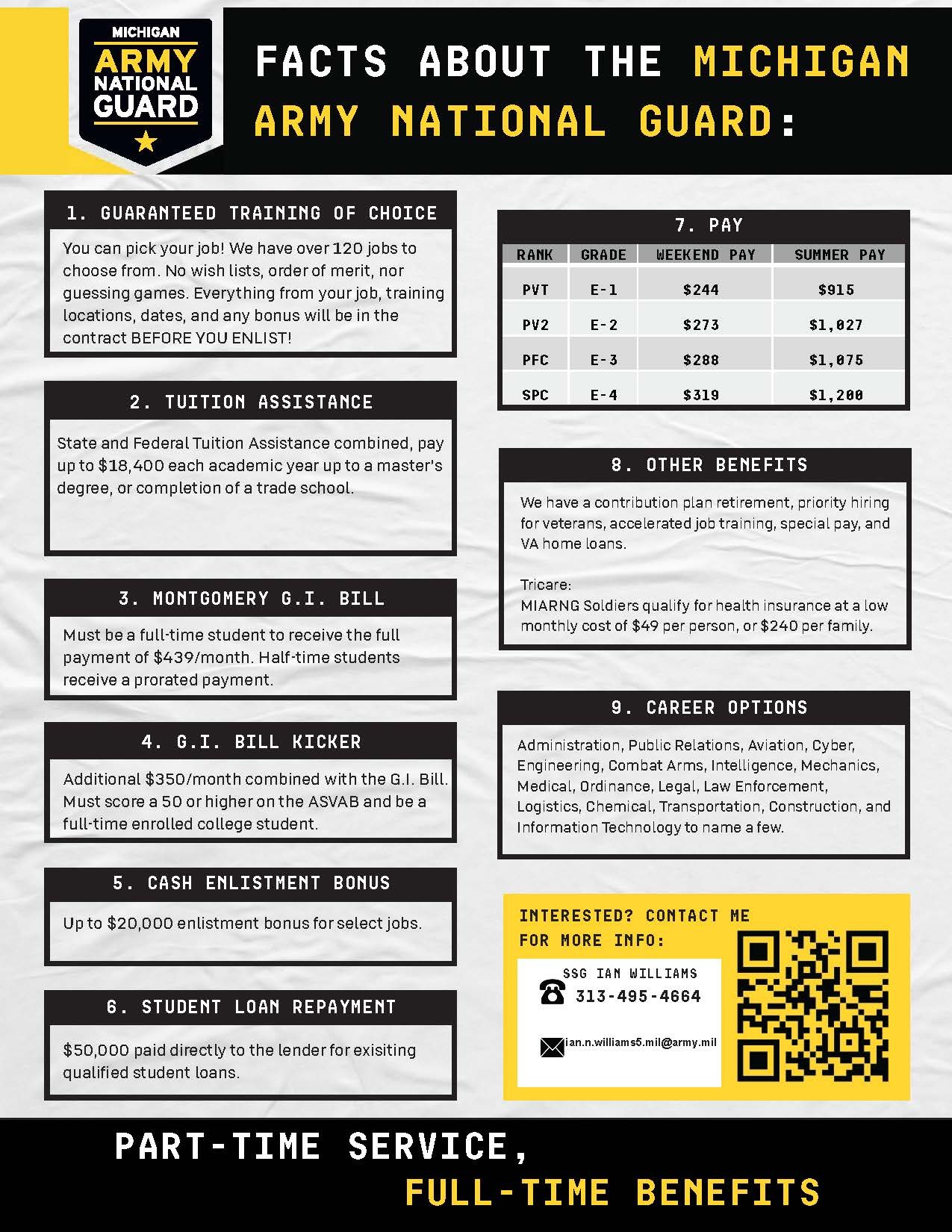
The Marine Corps is part of the DOD. It provides land combat, sea-based, and air-ground operations support for the other branches during a mission. This branch also guards U.S. embassies around the world and the classified documents in those buildings. Marine Corps Special Operations Command (MARSOC) members are known as Raiders. All service members are referred to as Marines. The reserve component is Marine Corps Reserve.
The Navy is part of the DOD. It protects waterways (sea and ocean) outside of the Coast Guard’s jurisdiction. Navy warships provide the runways for aircraft to land and take off when at sea. Navy SEALs (sea, air, and land) are the special operations force for this branch. All service members are known as sailors. The reserve component is Navy Reserve.


The Space Force is a new service, created in December 2019 from the former Air Force Space Command. The Space Force falls within the Department of the Air Force. It organizes, trains, and equips space forces to protect U.S. and allied interests in space and to provide space capabilities to the joint force.
 The US Coast Guard is part of the Department of Homeland Security (DHS). It’s responsible for maritime law enforcement, including drug smuggling. It manages maritime search and rescue and marine environmental protection. It also secures ports, waterways, and the coasts. Service members are known as Coast Guardsmen, nicknamed Coasties. The reserve component is Coast Guard Reserve.
The US Coast Guard is part of the Department of Homeland Security (DHS). It’s responsible for maritime law enforcement, including drug smuggling. It manages maritime search and rescue and marine environmental protection. It also secures ports, waterways, and the coasts. Service members are known as Coast Guardsmen, nicknamed Coasties. The reserve component is Coast Guard Reserve.
Military Service Academies
For students who want to experience a military environment while getting a first-class education, the five service academies offer a fully-funded tuition that includes books, board and medical and dental care. The competition to get in is fierce and students should start the application process early during their junior year.
Admissions criteria include:
- High school academic performance
- Standardized test scores (SAT or ACT)
- Athletics and extracurricular activities
- Leadership experience and community involvement
- A congressional letter of recommendation (not required by the Coast Guard Academy)
Five Military Service Academies:
- United States Military Academy in West Point, NY
- United States Naval Academy in Annapolis, MD *Graduates serve in the U.S. Navy or the U.S. Marine Corps
- United States Air Force Academy in Colorado Springs, CO
- United States Coast Guard Academy in New London, CT *U.S. Coast Guard is under the jurisdiction of the Department of Homeland Security; however, reports directly to the Department of the Navy only in wartime
- United States Merchant Marine Academy in Kings Point, NY *The Merchant Marine Academy has a close relationship with the U.S. Armed Forces, as noted on its website, but is not part of the Department of Defense.
Explore Careers in the Military
Careers in the Military Explore/investigate job and career opportunities across the branches of the military.
Enlisted members versus Officers in the Military
Information below from USA.gov
Enlisted members make up most of the military workforce. They receive training in a job specialty and do most of the hands-on work. Usually, you’ll sign up for four years of active duty and four years inactive. After you’ve completed your active duty time, you can either extend your contract or re-enlist if you want to continue serving.
Officers make up a much smaller part of the workforce. To join as an officer, you typically must have a four-year college degree and complete an officer program. You compete for promotion to continue your career. Most officers are managers who plan and direct operations. Others are professionals like doctors and lawyers. Officers get paid more than enlisted members and enjoy certain other benefits.
You don’t have to join as an officer to become one though. You can join as an enlisted member and attend officer training later on.
Military Eligibility Requirements
Information from ASVAB.com
The first factor the military considers is age. To be eligible for regular enlistment in any branch, you must be 18 years old, or 17 with parental consent. The maximum age limit to join the military varies by branch.
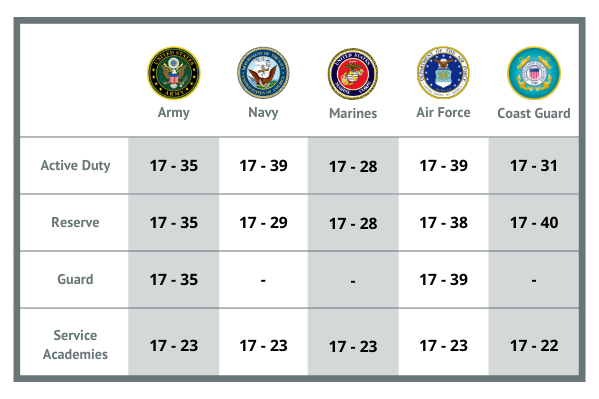
MILITARY CITIZENSHIP REQUIREMENTS
You must be a U.S. citizen or Legal Permanent Resident (with anI-551 Green Card) to be eligible to join the U.S. Military. In some cases, properly documented non-citizens may enlist.
Contact a recruiter for more advice on a specific situation.
MILITARY MEDICAL REQUIREMENTS
Many people are precluded from military service because they fall into one or more medically disqualifying categories. The Military’s Standards of Medical Fitness are structured to identify any medical complication, including mental health, that disqualifies a military service applicant. This very long list of medical conditions also includes common ailments such as asthma, depression, food allergies, and eczema.
Additionally, there is a list of “red flag” disqualifying medical conditions standards that may not permanently exclude you from military service. If you have had any of these medical conditions at any time in your life, you must tell your recruiter so that you can be considered for a medical waiver or risk possibly being dishonorably discharged.
Some of these conditions include:
- Physical limitations or deformities
- Sleep disorders
- Learning, psychiatric, or behavioral disorders
In some cases, applicants who fail to meet the established medical standards may be considered for a medical waiver. Discuss your options with a recruiter to address your individual circumstances.
Note that these medical standards do not apply to any medical issue associated with gender dysphoria or gender transition. Questions regarding medical standards or procedures should be directed to the Commander, U.S. Military Entrance Processing Command (USMEPCOM).
View the full list of permanently disqualifying medical conditions here.
MILITARY EDUCATION REQUIREMENTS
Though not mandatory, a high school diploma is preferred to enlist in the military. Those holding alternative credentials (a G.E.D. or certificate of attendance) and non-graduates may be assigned lower enlistment priority and may be limited in their service opportunities.
A 4-year university or baccalaureate degree is required to become an officer. Certain special occupations, like doctors, lawyers, and clergy, can join the military through direct commissioning. But they may require additional credentials or training to become commissioned officers.
MILITARY APTITUDE REQUIREMENTS
The military uses an applicant’s AFQT score, derived from the Armed Services Vocational Aptitude Battery (ASVAB test), to determine their eligibility to serve. Qualifying AFQT scores can change based on each service branch’s evolving needs, so it is always best to contact a recruiter to discuss your score and their current criterion.
Learn more about ASVAB and AFQT scores and what they mean.
MILITARY PHYSICAL REQUIREMENTS
Each service branch has a different set of physical requirements (such as timed runs, push-ups, sit-ups) that applicants must meet to enlist. This includes height and weight standards, as well as fitness screening requirements at boot camp.
Learn about the physical fitness requirements for each military service branch.
CHARACTER & CONDUCT REQUIREMENTS
The underlying purpose of character and conduct standards is to minimize the acceptance of applicants who are:
- Likely to become disciplinary cases or security risks.
- Likely to disrupt good order, morale, and discipline.
The U.S. Military is responsible for the defense of our nation and is not a rehabilitation program. At a minimum, an applicant is ineligible if they:
- Are under any form of judicial restraint, including bond, probation, imprisonment, or parole.
- Have a significant criminal record, including a felony conviction.
- Have a state or federal conviction or a finding of guilt in a juvenile adjudication for any sexual offense.
- Have exhibited antisocial behavior or other character traits that render the applicant unfit.
DRUGS & ALCOHOL
Applicants must participate in a substance screening process. Current or past alcohol and drug dependence or abuse are considered incompatible with military life. Therefore, those who test positive for illegal drugs are disqualified from enlisting. However, in some instances, these individuals may request a waiver.
As with medical and health conditions, it is best to discuss individual circumstances with a recruiter.
- You must take the Armed Services Vocational Aptitude Battery (ASVAB) test. The ASVAB has 10 subtests.
-
Your scores on four of those make up your Armed Forces Qualification Test (AFQT) score. This score determines which branch(es) you may join. Each branch has its own lowest score for joining.
-
Your scores on all 10 subtests determine which job specialties you qualify for.
-
- You can prepare for the ASVAB by taking sample questions.
- You must have a high school diploma or a GED to enlist. The services accept only a small number of people with GEDs each year. You can increase your chances of qualifying with a GED by:
- Earning some college credits and/or
- Scoring well on the Armed Forces Qualification Test (AFQT)
- ASVAB Program
Career exploration tool for careers in the military.
Steps for Joining the Military
Information below from USA.gov
1) Start by doing some research about your options for joining the military. Learn about the five active-duty branches and their part-time counterparts. Know the main differences between officers and enlisted members.
2) Once you know which branch you’re considering, contact a recruiter. A recruiter will give you an overview and answer your questions about that service. If you’re interested in more than one branch, contact a recruiter for each. If you’re interested in joining as an officer, the recruiter will explain any options you may be eligible for.
3) If you decide to enlist, you will report to a military entrance processing station (MEPS). You’ll spend a day or two completing pre-enlistment steps.
- These include taking the ASVAB, having a physical exam, meeting with a career counselor, and if you’re accepted,taking the oath of enlistment.
- From there you’ll receive orders for basic training, usually to start within a few weeks. (If you enrolled in a delayed entry program, you’ll go home and get orders for basic training within a year.)
Contact a Recruiter or Apply Online
Air Force
- Air Force Active Duty: 1-800-423-USAF (1-800-423-8723)
- Air Force Reserve: 1-800-257-1212
- Air Force National Guard: 1-800-TO-GO-ANG (1-800-864-6264)
Army
- Army Active Duty & Army Reserve: 1-888-550-ARMY (1-888-550-2769)
- Army National Guard: 1-800-GO-GUARD (1-800-464-8273)
Navy
- Navy Active Duty and Reserve: 1-800-USA-NAVY (1-800-872-6289)
Marine Corps
- Marine Corps Active Duty and Reserve: 1-800-MARINES (1-800-627-4637)
Coast Guard
Space Force
- Contact an Air Force recruiter: 1-800-423-USAF (1-800-423-8723)
Youth Programs
Young Marines
The Young Marines strengthens the lives of America's youth by teaching the importance of self-confidence, academic achievement, honoring our veterans, good citizenship, community service, and living a healthy, drug-free lifestyle. The Young Marines promotes the mental, moral and physical development of its members. The program focuses on character building and leadership and promotes a lifestyle that is conducive to being productive members of society. The Young Marines is the premier youth organization in its Drug Demand Reduction efforts.
The Young Marines is open to all youth ages 8 through the completion of high school. The only membership requirement is that the youth must be in good standing at school. Upon joining a local Young Marine unit, youth undergo a 26-hour orientation program, generally spread out over several weekly meetings. This orientation is called Recruit Training. The youth learn general subjects such as history, customs and courtesies, close order drill, physical fitness, and military rank structure. After graduating from Young Marine Recruit Training, the youth have the opportunity to learn even more new skills, earn rank, wear the Young Marine uniform and work toward ribbon awards. Young Marines earn ribbons for achievement in areas such as leadership, community service, swimming, academic excellence, first aid and drug resistance education.
US Naval Sea Cadet Corps
The senior cadet program exposes its cadets to the full rigors of a military training program. Cadets are required to attend a mandatory two-week recruit training camp. After this requirement is met, cadets are eligible to participate in a variety of advanced training sessions. These sessions serve to expose cadets to seamanship and seagoing subjects. They also focus on developing an appreciation for our country's rich naval history, customs and traditions.
After enrolling in the program, all Sea Cadets must attend a mandatory two-week recruit training session. These training sessions are taught at the Navy’s Recruit Training Command, at other naval bases or stations and at regional recruit training sites using other military host resources.
The curriculum of this training is approved by the U.S. Navy and standardized at all training sites. Cadets receive 106 hours of instruction, with a focus on the Navy’s core values of honor, courage and commitment. Both tone and tenor of instruction are modeled after the Navy’s recruit training.
US Air Force Auxiliary, Civil Air Patrol Cadet
Do you want to prepare for your future while making new friends? Would you like to conquer new Challenges while having some fun? Then rise to the challenge of cadet membership in the U.S. Air Force Auxiliary, Civil Air Patrol.
The CAP Cadet Program is a year-round program where Cadets fly, learn to lead, hike, camp, get in shape, and push themselves to new limits. If you’re dreaming about a career in aviation, space, or the military, CAP’s Cadet Program is for you.
To become a cadet, you must be be at least 12 years old and not yet 19 years old. Cadets meet 2 hours per week and one Saturday per month, on average, and also have opportunities to attend leadership encampments, career academies, and other activities during the summer.
US Coast Guard, Auxiliary Youth Sea Scouts
The Coast Guard Auxiliary has adopted the Boy Scouts of America’s Sea Scout program as its official youth program. The Sea Scouts are a program for young men and women ages 14 (or 13 years of age and completed eighth grade) through 20. Sea Scouts provide a program for religious, fraternal, educational, and other community organizations to use for effective character, citizenship, and mental and personal fitness training for youth. As part of this training, Sea Scouts are expected to develop personal religious values, learn the principles of American heritage and government, and acquire skills that will prepare them to become successful adults.
All Sea Scouts and Sea Scout leaders are automatically Associate Members of the Coast Guard Auxiliary Association. Any Sea Scout who is at least 14 years old or Sea Scout leader may also choose to become full members of the U.S. Coast Guard Auxiliary by following the normal application process.
Employment Support | Resources
Employment Support & Resources
Looking for a job?
Hot Jobs now hiring in Metro Detroit!
Pure Michigan Talent Connect Jobs Listings
Oakland County Virtual Job Fairs
Pure Michigan Talent Connect Job Fairs and Events
CoolWorks - Jobs in Great Places!
Looking for resume, interviewing, job hunting assistance?
Michigan Works Career Assistance Services
Michigan Works Oakland County Services & Programs for Youth
Michigan Works Virtual Career Workshops
Michigan Works Career Training Programs
Employability Skills Videos
Volunteer | Service Organizations
Volunteering & Service Organizations
AmeriCorps
AmeriCorps, a federal agency, brings people together to tackle the country’s most pressing challenges through national service and volunteering. AmeriCorps members and AmeriCorps Seniors volunteers serve with organizations dedicated to the improvement of communities. AmeriCorps helps make service to others a cornerstone of our national culture.
Peace Corps
The Peace Corps is a service opportunity for motivated changemakers to immerse themselves in a community abroad, working side by side with local leaders to tackle the most pressing challenges of our generation.
The Student Conservation Assoc.
The Student Conservation Association (SCA) is America’s conservation corps. Our members protect and restore national parks, marine sanctuaries, cultural landmarks and community green spaces in all 50 states.
Gap Year Information | Programs
Gap Year Information & Programs
What is a Gap Year?
Gap Year Planning Guide for Families
Accredited Gap Year Programs by the Gap Year Association
Find a Gap Year Program
City Year Americorps
City Year AmeriCorps members serve in hundreds of schools across 29 U.S. cities as student success coaches—near-peer tutors, mentors and role models who partner with classroom teachers to provide students with academic, social and emotional support when they need it the most. We have 40,000 alumni across the country who continue to lead and serve.
The big reason we recommend young people consider a year of service before going to college is that it gives you the chance to earn money, grants, and hands-on experience while you figure out what you really want to do.
Not everyone has a clear idea of what they’d like to study or what career they want to enter immediately after high school. It’s important that young people have access to high-quality service opportunities, internships, and gap years to explore different environments, develop valuable skills, and spend time learning and reflecting on their goals and aspirations while they give back to their community.
A year of service also offers young people benefits, money, and resources that can help them afford their next step. City Year AmeriCorps members earn a bimonthly stipend worth at least $20,000 a year (pre-tax) while they serve; have access to exclusive partnerships, grants, and scholarships; and are eligible for a $6,895 Segal Education Award they can apply to future studies, educational travel, and student loan debt.
In other words, a year of service not only gives you time and space to figure out your next step—it provides money and resources that help you afford college.
Apply to City Year on the Common App!
Once you’ve created a Common App account, simply search for “City Year” in the College Search tab of your account. “City Year AmeriCorps Member – Year of Service” will appear, click Add to add City Year to your colleges list.
Berkley HS Counseling News!
View Archives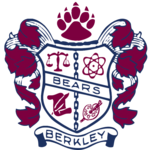
Log-in to Xello
Online Career + Career Research Tool

Xello Student Log-in
Go to “BHS Links” bookmark folder/bar in upper left corner.
Click on "Clever" > "sign in with Google" > scroll to "Xello" > click on "Xello"

Educator Log-in
(select Berkley account)
Any employer, trade school, military branch, or apprenticeship interested in scheduling a visit at Berkley HS or having info publicized in our newsletter, please contact Christina Belsky via email.
Schedule an appointment with Mrs. Belsky!
Career Exploration Resources
 Check out videos from actual professionals in lots of career fields! (Sign-in with Google, select BRK account)
Check out videos from actual professionals in lots of career fields! (Sign-in with Google, select BRK account)
Michigan's Hot 50 Jobs Outlook!
SE Michigan Career Outlook thru 2028
O*NET OnLine
Michigan Talent Pathfinder
-
29 Apr
-
NHS Induction Rehearsal 3:30 PM to 4:30 PMNHS Induction RehearsalDate: Apr 29Time: 3:30 PM to 4:30 PMLocation: East GymCalendar: BHS Counseling Department Calendar
-
-
30 Apr
-
WMU - Admitted Senior Workshop 11:30 AM to 12:30 PMWMU - Admitted Senior WorkshopDate: Apr 30Time: 11:30 AM to 12:30 PMCalendar: BHS Counseling Department Calendar
-
-
1 May
-
Deadline to complete Start Here lesson in XelloDate: May 1Calendar: BHS Counseling Department Calendar
It is required that you complete this lesson every year. Seniors - this is a graduation requirement!
Here are the instructions to access Xello and complete the lesson! or check the Xello folder under Materials. Let Mrs. Belsky know if you have questions.
-
UDM Admitted Seniors Workshop 9:30 AM to 10:30 AMUDM Admitted Seniors WorkshopDate: May 1Time: 9:30 AM to 10:30 AMCalendar: BHS Counseling Department Calendar
-
-
2 May
-
NHS Induction 7:00 PM to 8:00 PMNHS InductionDate: May 2Time: 7:00 PM to 8:00 PMCalendar: BHS Counseling Department Calendar
-
-
3 May
-
Oakland U Admitted Senior Workshop! 9:30 AM to 10:30 AMOakland U Admitted Senior Workshop!Date: May 3Time: 9:30 AM to 10:30 AMCalendar: BHS Counseling Department Calendar
-
-
6 May
-
Understanding Your Financial Aid Packages from Colleges 11:45 AM to 12:45 PMUnderstanding Your Financial Aid Packages from CollegesDate: May 6Time: 11:45 AM to 12:45 PMLocation: College + Career CenterCalendar: BHS Counseling Department Calendar
Be sure to bring: college/university portal usernames and passwords, financial aid offer letters
-
-
8 May
-
Honors Convocation 7:00 PM to 9:00 PMHonors ConvocationDate: May 8Time: 7:00 PM to 9:00 PMCalendar: BHS Counseling Department Calendar
-
-
9 May
-
OCC Admitted Seniors Workshop 1:30 PM to 2:30 PMOCC Admitted Seniors WorkshopDate: May 9Time: 1:30 PM to 2:30 PMCalendar: BHS Counseling Department Calendar
-
-
14 May
-
Next Steps for Seniors attending EMU! 10:30 AM to 11:30 AMNext Steps for Seniors attending EMU!Date: May 14Time: 10:30 AM to 11:30 AMLocation: College + Career CenterCalendar: BHS Counseling Department Calendar
-
